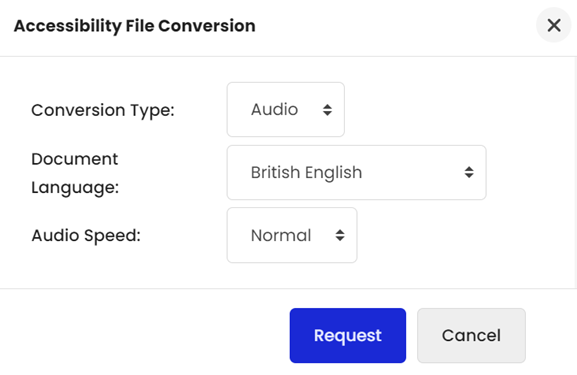Providing alternate file formats with Brickfield
The ability for students to customise the way they interact with learning materials is an important part of creating an inclusive online learning experience. In the University of Wollongong’s Learning Platform, this process is largely automated using the Brickfield Accessibility Toolkit, allowing students and educators to access educational materials and resources in their preferred format.
Staff and students can download most materials and resources in the Learning Platform in many alternative formats including, but not limited to, Braille, transcripts, ePUB, tagged PDF, and text to speech/narrated audio.
Why?
Providing alternative formats of educational resources allows students the flexibility to customise their learning experience to suit their individual or environmental needs. “Inclusion, equality and diversity are core to the University of Wollongong's vision. UOW is committed to making its website accessible to all people regardless of their ability and environment” (University of Wollongong, n.d.) through the application of the Web Content Accessibility Guidelines (WCAG). By adhering to WCAG, we ensure that educational experiences and resources are operable and understandable.
Australian universities must meet the Disability Standards for Education 2005, mandating equitable access to educational opportunities for students with disabilities and providing that same fair access to educational resources and opportunities for all students (Australian Government, 2005).
The availability of alternative formats aligns with the adoption of Universal Design for Learning (UDL) principles by providing multiple means of representation, engagement, and expression, facilitating a more inclusive learning environment (CAST, 2018). UDL benefits all learners by accommodating learning preferences and reducing barriers to learning (Meyer, Rose, & Gordon, 2014).
How?
Design for accessibility
If the materials you add to the Learning Platform are designed for accessibility, it will minimise the chances of generated alternative formats having issues.
Specific guidance on how best to design for accessibility may vary depending on the context, such as the tools being used. For example, guidance on using the accessibility checking tools in the Microsoft 365 suite is available on the Microsoft website.
The L&T Hub articles best practice for creating hyperlinks and representing data visually are also available to support planning, formatting and structuring your document correctly.
Other activities and resources in the Learning Platform can also be converted to alternative formats, such as Pages and Moodle Books.
Requesting alternative formats through Brickfield
The Brickfield Accessibility Toolkit is used to provide alternative formats to our students via the Learning Platform at UOW.
To request an alternative format:
- Click the Brickfield icon, denoted by three coloured arrows in a circle next to the activity, resource, or file name.
The example below shows a Moodle Book available to be downloaded in alternative formats.
- Select the Conversion Type and specifications from the Accessibility File Conversion menu.
In the example pictured below, the requested format is an Audio conversion, where the document will be read at a Normal speed in British English.
- Click the Request button.
Note: Files larger than 1GB cannot currently be converted. - An email will be sent while this file is created.
In this example, an MP3 file will be generated and will become available for the user who requested it. It will remain available for a set period without the need to be regenerated if requested by another user (regardless of if they are staff or student).
Related information
- Brickfield Education Labs - File conversions | External Resource
- Microsoft Support – Making documents accessible | External resource
- Microsoft Support – Create accessible PowerPoint presentations | External resource
- Microsoft Support - Create accessible Word documents | External resource
- Microsoft Support – Create accessible Excel workbooks | External resource
References
Australian Government. (2005). Disability Standards for Education 2005. Federal Register of Legislation. https://www.legislation.gov.au/Details/F2005L00767
CAST. (2018). Universal Design for Learning Guidelinesversion 2.2. http://udlguidelines.cast.org
University of Wollongong (n.d.) Web Accessibility Statement. Retrieved April 24, 2024, from https://www.uow.edu.au/web-accessibility/
World Wide Web Consortium. (2018). Web Content Accessibility Guidelines (WCAG) 2.1. https://www.w3.org/TR/WCAG21/



